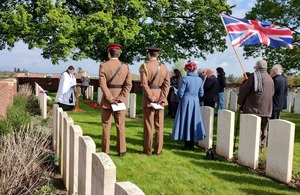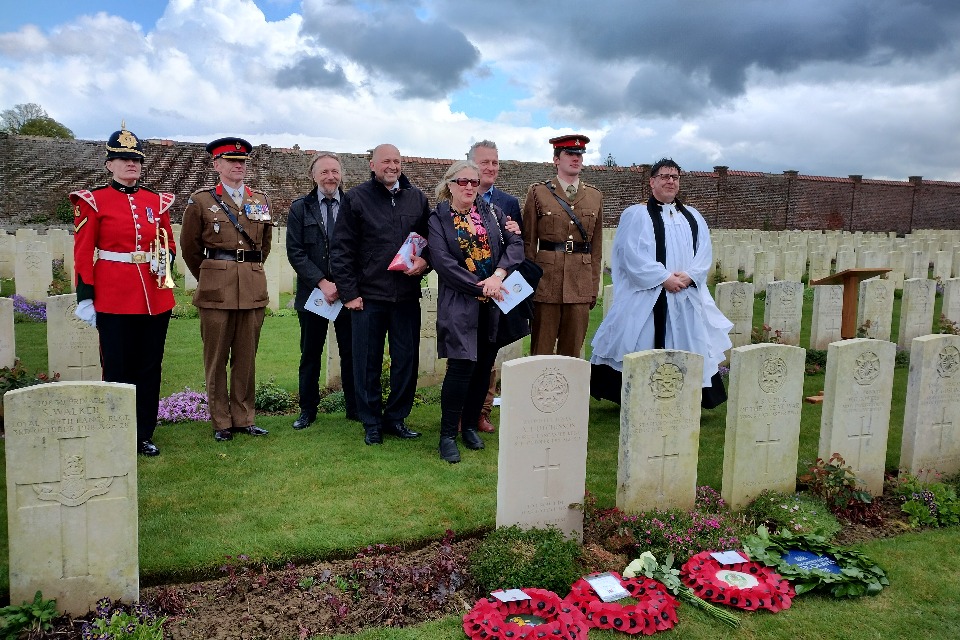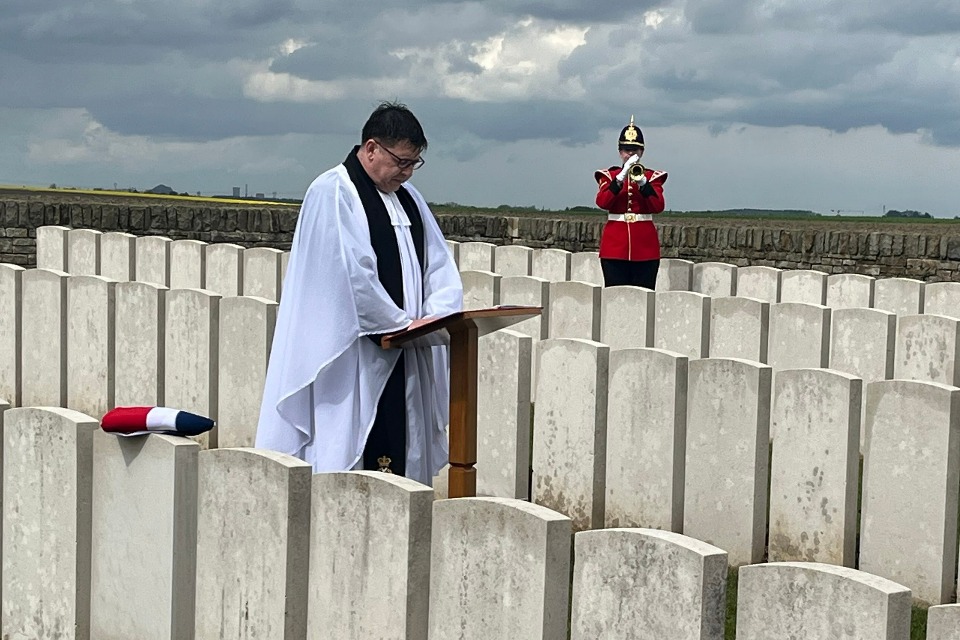Graves of five soldiers of the York and Lancaster Regiment identified on the Western Front
The graves of five soldiers of The York and Lancaster Regiment, most of whom went missing in France in the weeks before the end of World War One, have now been marked more than a century after their deaths.

The Rev Robert Desics CF, Chaplain to 1st Battalion The Royal Yorkshire Regiment, conducts the rededication service for Pte Lane in Auberchicourt British Cemetery. Crown Copyright.
Rededication services for Private (Pte) George Galloway, Second Lieutenant (2ndLt) Albert Hutchinson, Pte Charles Ernest Lane, Lance Corporal (LCpl) Thomas Gustafson and Corporal (Cpl) William Swan, were organised by the MOD’s Joint Casualty and Compassionate Centre (JCCC), also known as the ‘MOD War Detectives’ and were attended by serving soldiers of The Royal Yorkshire Regiment.
The services were held at the Commonwealth War Graves Commission’s (CWGC) Achiet-le-Grand Communal Cemetery Extension (16 April), Busigny Communal Cemetery Extension (16 April), Auberchicourt British Cemetery (17 April) and York Cemetery, Haspres (17 April), all in France. The families of 2ndLt Hutchinson, Pte Lane and Cpl Swan attended.
By October 1918, weeks before the end of the conflict, the stalemate on the Western Front had lifted and the German Army was rapidly retreating eastwards across open ground. All but Pte Galloway, were killed during this fighting.
JCCC Caseworker, Rosie Barron, said:
All five of these men enlisted early in the war and it is hard to imagine how their families would have felt on hearing the news of their deaths, especially those killed so close to the end of the fighting when the news may have come through after the Armistice. It has been a privilege to have played a part in their stories and to know that their families finally have answers as to what happened to them.
The graves of these men came to light after researchers submitted evidence to CWGC hoping to have identified them. After further research carried out by CWGC, the National Army Museum and JCCC, these findings were confirmed.
Pte George Galloway
Pte Galloway from Barnsley, South Yorkshire, was serving with 14th Battalion The York and Lancaster Regiment, known as the 2nd Barnsley Pals, when he went missing on the night of 3 June 1916. At midnight an intense bombardment came down on the enemy line near Serre on the Somme, and the raid began. It failed and saw the deaths of three men. Efforts were made to recover the wounded, but Pte Galloway remained missing, he was 30 years old. Following the raid his body was recovered by the Germans who buried him as an unknown soldier of The York and Lancaster Regiment in Achiet-le-Grand Communal Cemetery Extension. Because he was missing, Pte Galloway was commemorated on the Thiepval Memorial.
2ndLt Albert Hutchinson
2ndLt Hutchinson from Hull, East Yorkshire, enlisted into 4th Reserve Battalion The East Yorkshire Regiment at the age of just 16 on 19 November 1914. He spent most of the war with 5th (Cyclist) Battalion The East Yorkshire Regiment (a mobile coastal defence unit which carried out defence duties along the east coast of the UK) before being Commissioned. Having only arrived on the Western Front on 15 September 1918, aged 20, he was killed on 8 October 1918 when 2nd Battalion The York and Lancaster Regiment took part in an attack towards the village of Mericourt, north east of Saint Quentin. After the war his remains were recovered and buried in Busigny Communal Cemetery Extension as an unknown second lieutenant of The York and Lancaster Regiment. Because he was missing, 2ndLt Hutchinson was commemorated on the Vis-en-Artois Memorial.

The family of 2ndLt Hutchinson stand with the military party at his graveside in Busigny Communal Cemetery Extension. Crown Copyright.
Pte Charles Ernest Lane
Pte Lane from Aston, Warwickshire, had served with both The Worcestershire Regiment and The Hampshire Regiment before being transferred to 1/4th Battalion The York and Lancaster Regiment. On the morning of 2 November 1918, the battalion was in the line near Aulnoy, south of Valenciennes. Patrols were sent out that morning before at 3pm and A and D Companies were ordered to advance. They advanced under a heavy barrage and machine gun fire, but their objective was met at 03:30 hours One Officer and nine other ranks were killed. Pte Lane, aged 28, was among those who died. He left behind a widow and young daughter. After the war, his remains and those of 34 other men were moved into Auberchicourt British Cemetery, from Aulnoy British Cemetery. He was buried as an unknown soldier 1/4th Battalion The York and Lancaster Regiment. Because he was missing, Pte Lane was commemorated on the Vis-en-Artois Memorial.
LCpl Thomas Gustafson
LCpl Gustafson from Willington Quay, Northumberland, was the son of a Swedish migrant. He arrived on the Western Front on 20 April 1915 and served with 1/5th Battalion The Northumberland Fusiliers until he was wounded in the spring of 1918. Upon his return to action he was transferred to 1/4th Battalion The York and Lancaster Regiment. On 13 October 1918, the battalion took part in an attack on Haspres, north east of Cambrai. They came under heavy machine gun and artillery fire on the ridge to the west of Haspres suffering heavy casualties. The attack was held up nearly a kilometre from the village. Lance Corporal Gustafson was amongst those killed in the fighting that day. Afterwards his remains were recovered, and he was buried as an unknown lance corporal of 1/4th Battalion The York and Lancaster Regiment in York Cemetery, Haspres. Because he was missing, LCpl Gustafson was commemorated on the Vis-en-Artois Memorial.

LCpl April Farthing of The Band of The Royal Yorkshire Regiment plays the last post during the rededication service for LCpl Gustafson and Cpl Swan at York Cemetery, Haspres. Crown Copyright.
Cpl William Swan
Cpl Swan from Dunfermline, Scotland, enlisted on 11 January 1915, and was posted to 3rd Battalion The King’s Own Scottish Borderers. On 18 July 1915 he arrived in Egypt and was posted to 1st Battalion who were fighting in Gallipoli. In March 1916, 1st Battalion The King’s Own Scottish Borderers left Egpyt for France. He transferred to 8th Battalion The York and Lancaster Regiment and on 8 October 1916 and was wounded on the Somme. By 13 October 1918, he was serving with 1/5th Battalion The York and Lancaster Regiment which was also involved in the attack on Haspres. D Company, to which he belonged, fought its way into Haspres suffering around 70 percent casualties. Cpl Swan, aged 22, was recorded as wounded and missing. Following the fighting his remains were recovered and he was buried as an unknown corporal of 1/5th Battalion The York and Lancaster Regiment in York Cemetery, Haspres. Becausehe was missing, Cpl Swan was commemorated on the Vis-en-Artois Memorial.
The services were conducted by the Reverend Robert Desics CF, Chaplain to 1st Battalion The Royal Yorkshire Regiment.
The Reverend Desics said:
It was a wonderfully moving honour to rededicate the graves of these five fallen comrades, and to restore their names to them after more than a century. Names mean so much because names carry our identity and our history, and so in knowing the names of these brave soldiers we now know their histories and are able to share in the telling of their stories. But we must never forget that even though these men who made the ultimate sacrifice were unknown to us for so long they have always been fully known to God in whom they rest awaiting their eternal reward.
The headstones over the graves were replaced by CWGC.
Xavier Puppinck, CWGC Area Director for France, said:
It is both an honour and a privilege for the CWGC to care for the graves of these five valiant soldiers of The York and Lancaster Regiment, who made the ultimate sacrifice during the final weeks of World War One. Their stories, unearthed through meticulous research and shared through these rededication services, serve as poignant reminders of their courage and dedication. CWGC stand committed to ensuring that their memory lives on in perpetuity, providing a place of reverence and respect for generations to come.